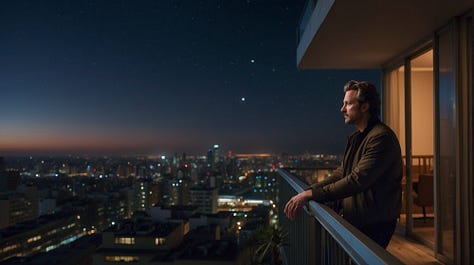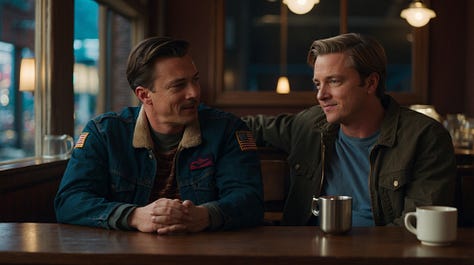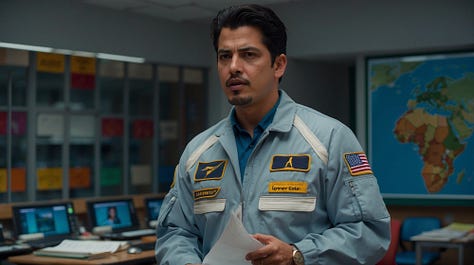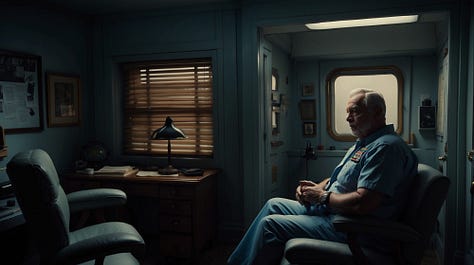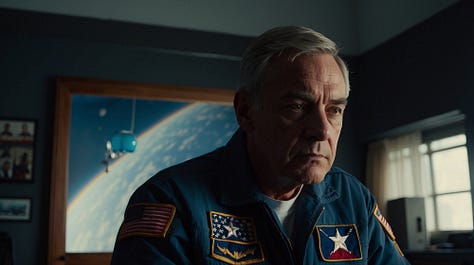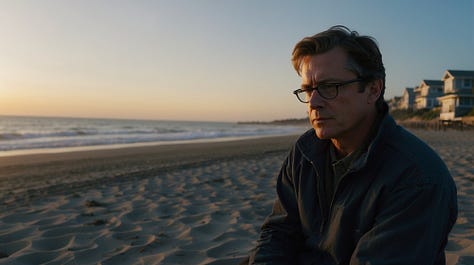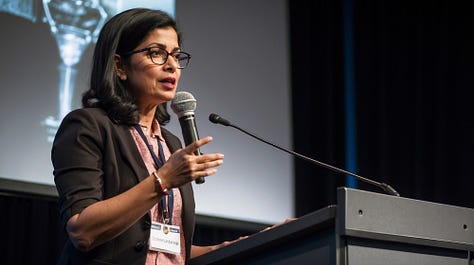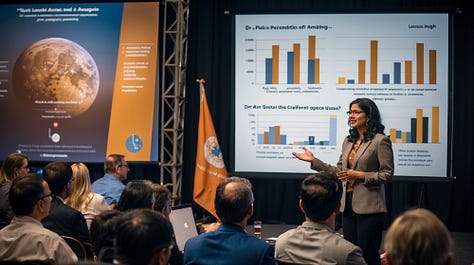On the balcony of his Florida home, Commander Cameron Mitchell stood in contemplation, his gaze drifting between the earthbound city lights and the celestial bodies above. The neon veins sprawling beneath him illuminated the paradox of modern existence—symbols of human connection that also delineated the fractures of individual isolation. This duality mirrored the internal conflict Mitchell felt, a poignant reflection of his transformation since returning from the cosmos.
Leaning against the railing, he felt the teachings of the Keeper resonate within him, a spectral presence that had once guided his voyages through the stars but now left him unmoored in the terrestrial life he was struggling to reclaim. The universe, once a vast field of discovery, now whispered haunting truths, revealing secrets that seemed to deepen the chasm between him and the world he once knew.
"The irony is palpable," Mitchell whispered into the night, his voice lost amid the sighing winds and distant city sounds. "In my quest to touch the infinite, I've found myself detached, distant from the tangible, from the very essence of being human." The Keeper’s silence gnawed at him, a void where once there was wisdom, leaving Mitchell to navigate the complexities of his reintegration alone.
The city's digital glow, a stark contrast to the dark, sprawling heavens, underscored his sense of dislocation. "We've erected digital fortresses, thinking we’re connecting worlds, yet in truth, we're often isolating souls," he mused, the realization bitter on his tongue. Since his return, the Keeper’s absence had been a silent storm, its quietude more alarming than its previously cryptic counsel. "What are you planning?" he muttered, half-expecting the wind to carry an answer, a sign that his celestial guide had not abandoned him to the void.
Amidst these reflections, a spark of understanding flickered within Mitchell. The lessons from the Keeper, enigmatic and profound, hadn't merely been about navigating the cosmos but understanding the intricate dance of existence itself. With each revelation, the distance he felt had grown, yet it also cast a light on a path less discerned—a journey not outward into the void but inward, towards the core of human connection.
"Maybe," Mitchell considered, a nascent determination stirring within, "the true voyage is about rediscovering our shared humanity, about mending the fractures that have widened in our relentless pursuit of progress." The silence from the Keeper, once disquieting, now seemed a challenge, pushing him to find his own way through the maze of his existential dilemma.
As the night deepened, Mitchell stood resolute, a figure poised between two realms—the vast, indifferent universe and the pulsating life of Earth. In this liminal space, he grasped the essence of his journey: to bridge the cosmic lessons with the earthly experience, to weave the celestial wisdom into the fabric of human engagement. The Keeper's silence, rather than an end, marked a new beginning, a call to step into the role he was meant to play, not just as an explorer of space but as a shepherd of human connection, guiding those around him towards a future where the stars and the heart converge in a symphony of understanding and unity.
The Florida night, with its heavy air and chorus of distant, nocturnal sounds, served as the backdrop to Commander Mitchell's introspection. Alone on his balcony, he was a solitary figure grappling with the enormity of his experiences. The world around him buzzed with the invisible currents of digital life, yet in this moment, he felt disconnected from the vibrant tapestry of human existence that lay just beyond his reach. The stark contrast between the interconnectedness promised by modern advancements and the profound isolation of the individual mirrored the conflict raging within him. Yet, in this realization, Cameron found not despair but the ember of a new resolve—to harness the insights gained from his cosmic voyage to reforge the bonds of human connection that had frayed in his absence.
In the dim light of the café, a sanctuary from the relentless pace of the world, Cameron and Alex Mitchell found themselves not just reconnecting as siblings, but as anchors in the swirling currents of change. The café, a quaint emblem of simpler times, became the stage for their reconciliation and shared journey into the depths of the human experience.
Cameron, leaning forward, his eyes reflecting the starry skies he'd traversed, shared his profound transformation. "Alex, out there, in the void, I touched the fabric of the cosmos, felt its vastness echo in the confines of my soul. But it's here, in this small, bustling world, where I grapple with the enormity of what I've experienced."
Alex, his face a mirror of empathy and understanding, nodded. "I can only imagine, Cam. But maybe, that vastness, those cosmic whispers you heard, they're not meant to isolate you but to enrich the tapestry of our human experience. To bring depth to our collective journey."
As they delved into the heart of Cameron's odyssey, the space between them, once stretched by time and the silence of the cosmos, began to close. Their conversation meandered through the realms of existential wonder and terrestrial reality, a delicate dance of cosmic insight and earthly connection.
Cameron's journey, once a solitary quest among the stars, found its counterpart in Alex's grounded perspective, offering a glimpse into the possibility of melding the celestial with the terrestrial. "You know, Alex, up there, I saw Earth as a fragile oasis in the vastness of space. It made me realize the preciousness of our shared home, of every moment we spend connected, not just through technology but through the very essence of our being."
Alex, his eyes alight with a mixture of curiosity and concern, leaned in. "So, what now, Cam? How do we bridge this cosmic distance you feel, not just for you but for all of us tethered to this world?"
The café, with its gentle hum of life and the soft clinking of cups, wrapped around them, a cocoon against the vast, indifferent universe outside. "It starts with conversations like this, Alex," Cameron replied, a tentative smile breaking through his contemplative demeanor. "By sharing our stories, our insights, we can begin to weave a new narrative, one that doesn't just reach out to the stars but also delves into the depths of our collective soul."
Their dialogue, rich in shared discoveries and silent understandings, became a microcosm of the larger journey humanity faced. In this quiet corner of Earth, two brothers, once separated by the expanse of space and the divergence of life paths, rediscovered their common ground, charting a course that could lead not only to personal reconciliation but also to a collective awakening.
As they stood to leave, the café no longer seemed like a mere backdrop to their reunion but a symbol of the potential for human connection in the face of cosmic vastness. "Let's take this journey together, Cam," Alex said, his hand clasping Cameron's shoulder. "Not just for us, but for everyone looking up at those stars, wondering about their place in the grand scheme of things."
With a renewed sense of purpose, Cameron nodded, the weight of isolation lifting in the presence of his brother's steadfast support. "Together, Alex. We'll bridge the cosmic divide, one heart, one story at a time."
As Cameron and Alex Mitchell exited the café, their silhouettes merged with the twilight, embodying the fusion of cosmic wisdom and earthly kinship. Their departure symbolized a broader journey, one reflective of humanity's quest to reconcile the marvels of the cosmos with the essence of human connection. The Mitchell brothers, forever altered by the celestial sojourns and the Keeper's cryptic teachings, had found in each other a grounding force, a shared beacon for the collective voyage ahead.
Meanwhile, in the hushed reverence of the astronaut training facility, Lieutenant Julian Diaz bridged worlds with his words, casting a spell of wonder and resolve over the attentive cadets before him. His transformation from a solitary navigator of the stars to a guiding light for the next wave of explorers marked a profound shift—a journey of rediscovery and mentorship that transcended the physical bounds of space travel.
"Remember," Diaz imparted with a solemn yet hopeful tone, "the cosmos is not just a realm of cold voids and distant stars. It's a mirror reflecting our own selves, our fears, and our potential. As we traverse the heavens, we also navigate the depths of our own humanity, discovering not just new worlds outside, but uncharted territories within."
The young astronauts, inspired by Diaz's wisdom, were not just learning to operate spacecraft or chart courses through the galaxy; they were being prepared to face the existential odysseys of their future missions, armed with the understanding that the greatest explorations are those that bridge the outer universe with the inner soul.
"As you embark on this journey," Diaz began, his voice carrying the weight of experience and the subtle tremor of unspoken emotions, "you'll find that space is not just a physical expanse to be traversed. It's a realm that tests the limits of your courage, the depth of your solitude, and the strength of your resolve." His gaze drifted momentarily to the window, where the early morning sky hinted at the vastness he spoke of.
One of the students, captivated by Diaz's introspection, ventured a question that seemed to hang in the minds of many. "Lieutenant Diaz, what was it like, the first time you looked back at Earth from space?"
Diaz paused, the question transporting him back to that transformative moment. "Seeing Earth from that vantage point," he reflected, "was both humbling and exhilarating. It was a reminder of our planet's fragility, a tiny oasis in the vast desert of space. But more than that, it was a profound realization of our interconnectedness, of our collective responsibility to cherish and protect this home."
In the subdued lighting of the classroom, where the future of space exploration hung on every word, Lieutenant Julian Diaz stood before his students, not just as an instructor but as a beacon guiding them through the uncharted territories of space and the soul. "Navigating the cosmos goes beyond the mechanics of spacecraft and the physics of travel," Diaz said, his gaze sweeping across the room, capturing the attention of every aspiring astronaut. "It's a voyage that tests the mettle of your spirit, demanding an inner strength forged from the solitude and vastness you'll encounter."
He paused, allowing his words to resonate, to sink into the minds of those who sat before him, their eyes alight with dreams of stars. "Out there," he continued, his voice dropping to a near whisper, "you'll find a solitude that's profound, almost sacred. It's a solitude that can feel like isolation, or it can become a mirror, reflecting the very essence of your being, connecting you to the grand tapestry of humanity in ways you never imagined possible."
This was the crux of Diaz's teachings, a curriculum that went beyond the technical aspects of space travel to touch on the emotional and psychological resilience required for long-duration missions. He shared stories of his own experiences, of the silent majesty of the universe and the introspection it had forced upon him. "There were moments," Diaz admitted, "when the distance from Earth felt insurmountable, when the silence of space seemed to echo the solitude of my own heart. But it was in those moments that I truly understood the interconnectedness of all things, the shared humanity that binds us across the vastness of space."
His honesty, the raw openness of his reflections, transformed the classroom into a space of profound learning and connection. Diaz's journey, once marked by disorientation and a struggle to find his place upon returning to Earth, had become a guiding light for those who would venture into the stars. His narrative shifted from personal dislocation to a shared exploration of what it means to be human in the face of the infinite.
Through his mentorship, Diaz not only found a pathway back to himself and his connection to Earth but also ignited a passion within his students—a desire not just to explore the cosmos but to understand the deeper journey of the self that such exploration entails. "The greatest journey," Diaz concluded, "isn't measured in light-years or parsecs, but in the distance we travel within ourselves, in the bridges we build between our own hearts and the heart of the universe."
The transformation of Lieutenant Julian Diaz from a lone voyager of the cosmos to a mentor for the aspiring astronauts of tomorrow embodied a profound truth about human exploration. It wasn't the vastness of space or the technological marvels that defined the greatest journeys, but the introspective voyage that brought us closer to understanding our humanity and the unbreakable ties of shared existence that bind us across the infinite expanse. In the serenity of his classroom, surrounded by eager minds on the cusp of their own adventures among the stars, Diaz discovered a renewed sense of purpose. He tapped into the eternal human spirit—a force driven by curiosity, fortified by unity, and resilient in the vastness of the unknown.
Parallel to Diaz's journey of rediscovery, Dr. Anika Singh, ensconced in the heart of a buzzing research facility, navigated the complex interplay between her scientific endeavors and her personal quest for understanding. Her office, a reflection of the chaos and wonder of the universe with its scattered papers and softly glowing screens, became the epicenter of her groundbreaking work on the psychological impacts of space travel. Singh's research, deeply personal yet universally resonant, delved into the psychological echoes of astronauts' experiences in space, echoing her own feelings of estrangement upon returning to Earth.
Through her meticulous study, Singh unearthed a pattern of existential disquiet among space travelers, a reflection of her own internal struggle. "The dichotomy between the boundless expanse of the cosmos and the anchoring ties to Earth highlights a fundamental human paradox," she explained in one of her increasingly passionate lectures. "The further we venture into the unknown, the more we yearn for the familiar, for the essence of our terrestrial existence."
Her voice, a bridge between the empirical and the existential, resonated with her audience, transforming scientific data into a narrative about the human experience of space exploration. At a critical conference, Singh's presentation ventured beyond the physiological impacts of space travel to explore the psychological odyssey undertaken by astronauts. "The void of space challenges not only our physical but also our emotional and psychological boundaries, prompting us to reconsider our notions of connection and belonging."
Singh's work, once a solitary quest for answers, blossomed into a clarion call for a more holistic approach to astronaut training, one that considered the interwoven destinies of mind and body. Her research, acknowledged as a cornerstone in the field of astronaut psychology, illuminated the path for future explorers of the heavens, guiding them through the emotional and psychological rigors of space travel.
Moreover, Singh's introspective journey and her studies among her peers fostered a deeper understanding of the astronaut's paradox—the solitary voyage into the unknown that paradoxically underscores our interconnectedness. Her work revealed a fundamental truth: the quest for the stars, far from isolating us, highlights the intricate web of relationships that bind humanity together and to the planet that nurtures us.
In the dim, contemplative quiet of his home, Captain James Edwards found himself adrift in a sea of introspection, surrounded by the tangible memories of his space-faring exploits. The walls of his modest dwelling, adorned with images of celestial achievements and tokens of terrestrial acclaim, now seemed to echo a poignant solitude rather than triumph. These relics, once vibrant symbols of humanity's boundless quest and Edwards's personal dreams of cosmic unity, had transformed into poignant reminders of the chasm between those aspirations and the palpable reality of disconnection he now faced.
In the dim glow of his quarters, Captain James Edwards wrestled with the paradoxes of his journey. Once a fervent advocate for cosmic exploration, he now confronted the widening gulf between his celestial ambitions and the palpable dissonance of earthly life. The shadows in the room, elongated by the soft light, seemed to echo the growing disconnect between him and the essence of humanity he had once aspired to unify in the stars' pursuit.
Reflecting on his recent speeches, Edwards recognized the hollowness that had crept into his passionate orations. His words, once alive with the promise of collective destiny in the cosmos, now felt like echoes of a fading dream, dissolving into the solitude of a world increasingly fragmented by its own technological advancements.
It was during this introspection that Dr. Anika Singh, a beacon of empathy and understanding, entered. Her arrival pierced the solitude of his contemplation, offering a perspective that was both comforting and challenging. "James," she spoke, her voice a harmonious blend of warmth and wisdom, "your vision isn't obsolete; it's just that our world is still catching up to it. The universe isn't going anywhere. Maybe our focus should now be on healing the divisions that have taken root here, on our own planet."
Their conversation meandered through the realms of human psychology, societal shifts, and the transformative impact of space travel on the soul. Singh's insights, informed by her research and their shared experiences in space, shed light on Edwards's feelings of alienation, providing a new framework for understanding his internal turmoil.
"Maybe," Edwards mused, the seeds of renewed purpose taking root, "our true frontier lies not in the stars but in the uncharted territories of human connection. My duty extends beyond propelling humanity into space; it's about harnessing that venture to delve deeper into our shared humanity, knitting together the fabric of our collective existence."
This revelation signified a significant shift in Edwards's outlook. His commitment to space exploration remained steadfast, yet it now encompassed a more profound, introspective quest for unity—a plea to mend the threads of human connection before weaving humanity into the cosmic tapestry. His message transformed from a call to explore the unknown into a symphony of hope, urging humanity to reclaim the shared bonds that underpin their collective identity.
In this critical era, poised on the edge of technological and existential frontiers, Edwards's evolved vision shone brightly, guiding not only the journey to the stars but also illuminating the path to a future rooted in mutual understanding and resilient human bonds. This renewed call to unity, charged with the urgency of personal discovery, resonated deeply with those on Earth, sparking a renaissance of collective purpose and spiritual renewal.
At this pivotal moment in history, the experiences of the Chaffee crew, intertwined with the enigmatic wisdom of the Keeper, heralded a new chapter for humanity. Moving beyond the physical exploration of space, they embarked on a metaphysical journey into the essence of human connection and understanding. This collective narrative, shaped by individual challenges and revelations, invited them to grapple with the existential questions of their place in the cosmic order. Amid this intricate interplay of self-discovery and shared insight, a cohesive mission emerged, guiding them toward a destiny intricately woven into the universe's grand narrative.
In this delicate balance of personal reflection and cosmic destiny, the journey of the Chaffee crew transcends the stars, anchoring in the profound realization that the most significant explorations are not those that take us outward into the void, but those that bring us inward, to the core of our shared human experience. This chapter closes not on an ending but on the promise of a new beginning, where the unity of purpose and the spirit of connection light the way through the darkness, charting a course for a civilization united in its quest for knowledge, understanding, and the eternal journey of the human spirit.
Simultaneously, Earth, silently tracing its celestial path, became the backdrop for an emerging storm, a harbinger of Mordu's looming menace. These unseen disturbances, sending tremors of unrest through the veneer of daily life, signaled the onset of a conflict that dwarfed earthly comprehension. The subtle yet unmistakable signs of unease foretold a clash with entities shrouded in the mystery of the cosmos, heralding a threat of unprecedented scale.
In the midst of this unfolding epic, the Chaffee crew stood at a pivotal intersection, acutely aware of the growing darkness and the imminent shadow of Mordu. Their journey through the infinite had not only imbued them with the Keeper's ancient wisdom but had also united them as a vanguard against the encroaching darkness threatening their world.
"The challenge we confront now," Edwards declared, his voice resonating with the weight of their collective destiny, in a gathering that blurred the lines between a heartfelt reunion and a strategic assembly, "surpasses any we've faced in the void. It's upon this very soil that we must prove ourselves. Everything we've learned, every truth bestowed upon us by the Keeper—it all converges on this pivotal moment."
The crew, with the knowledge of their intertwined fate heavy upon them, grasped the magnitude of their situation. They understood that the battle looming on the horizon would demand more than their celestial acumen; it called for the mobilization of humanity's core—the shared strength, solidarity, and indomitable courage that had propelled them through the dark reaches of space.
"As we brace for this confrontation," Edwards continued, his gaze imbued with the steely determination that had marked his command, "we do so not merely as pioneers of the unknown but as protectors of our home. Our mission extends beyond the preservation of our celestial endeavors to safeguarding the essence of humanity itself."
With this rallying call, the crew's mission evolved beyond the mere exploration of space, morphing into a crusade for the essence of human existence. In this era, poised on the cusp of groundbreaking technological advancements, their collective odyssey underscored the resilience of the human spirit—a testament to our capacity to navigate the stars, face the unknown, and, ultimately, unite in a luminous stand against the darkness with a fortitude forged from the celestial fire and the unyielding human will.
In the serene glow of Earth's moon, a symbol both of humanity's reach towards the cosmos and its grounding pull towards home, the Chaffee crew gathered in a secluded enclave, chosen as much for its symbolic significance as for its privacy. This assembly, set against the quiet backdrop of the world they had left behind and returned to, marked the beginning of a new chapter not just in their lives but in the annals of human history.
The atmosphere was charged with a palpable sense of purpose, an electric tension born from the intersection of anticipation, apprehension, and the profound recognition of the moment's gravity. As they encircled the weathered table that bore silent witness to their reunion, the relics of their individual journeys—both seen and unseen scars—served not as reminders of weakness but as testament to their resilience and shared humanity.
Captain James Edwards spoke, his voice embodying the steadiness of a seasoned leader yet underscored by an unmistakable urgency. "In the vast silence of space, we were granted a glimpse beyond the veil of our understanding, revealing a duty that extends beyond our personal endeavors—a duty to protect our world from a threat that lies beyond the realm of our comprehension," he stated, his gaze locking with each of his crew, seeking and finding an echo of his resolve mirrored in their eyes.
Dr. Anika Singh, bridging the gap between empirical evidence and the existential questions that their journey had unearthed, added her voice to the chorus. "Our odyssey with the Keeper has not merely broadened our perspective of the cosmos; it has charged us with a guardianship. The encroaching darkness, Mordu's shadow, necessitates our unity, drawing upon every lesson imparted by our cosmic journey to shield this fragile oasis we call home."
Lieutenant Julian Diaz, embodying both the warrior's courage and the scholar's insight, leaned in, his expression one of grim determination. "Our voyage through the stars, our confrontation with the void, has transformed us. These experiences, these revelations bestowed by the Keeper—they're not mere gifts but a call to arms, tools with which to combat the looming darkness."
Mitchell, whose existential journey had led him from the depths of desolation to a renewed purpose, interjected with fervor. "We stand at the cusp of a narrative far greater than any one of us, a saga that spans the dawn of existence. We are not merely witnesses to this story; we are its stewards, tasked with ensuring that the scales tip in favor of light, in favor of humanity."
As their plans unfolded, shaped by a blend of their scientific expertise and the ethereal insights gleaned from their journey, a strategy emerged. It was a blueprint not just for survival but for a counteroffensive, one that would marshal the collective will and wisdom they had acquired, rallying the forces of Earth in defense against the encroaching darkness.
In that moment of parting, under the watchful gaze of the moon—a celestial guardian mirroring their newfound guardianship—each member of the Chaffee crew carried with them not just the weight of the task ahead but a sense of unity forged in the crucible of space. This gathering, initially a convergence of souls seeking understanding and solace, had evolved into a pivotal juncture, a declaration of their collective resolve to defend not only the future of human exploration but the very essence of humanity itself.
As the crew members took their leave, their steps resonating with a purpose far greater than any individual ambition, Captain James Edwards offered a parting directive, his voice imbued with the gravity and hope of their mission. "Be back at Cape Canaveral in three months. Enjoy your home leave, and I'll see you for new orders in October." His words, simple yet profound, encapsulated the journey ahead—a journey not just back to the stars but towards safeguarding the home they all shared.
The crew dispersed into the night, each person a beacon of hope in their own right, tasked with rallying the forces of Earth for the unseen battle that loomed on the horizon. Their steps, though divergent, were united by a common purpose, each path a thread in the fabric of humanity's collective fight for survival and unity.
In the silence of their departure, the moon continued its vigil, a timeless witness to the cycles of human endeavor and the eternal quest for knowledge and connection. This time, however, it watched over a species that stood on the brink of a new dawn, a civilization ready to confront the shadows with a light forged from the unbreakable will and indomitable spirit of its people.
The Chaffee crew, once mere explorers of the physical cosmos, had now embraced a greater calling as custodians of humanity's future. In the face of adversaries that dwelled beyond the realm of human understanding, they stood ready, a testament to the power of shared purpose and collective resolve.
As the dawn of this new epoch approached, the spirit of exploration that had propelled humanity into the cosmos now illuminated a path forward through the darkness. This path, lit by the bonds of camaraderie and the fire of determination, promised not merely the survival of humanity's celestial dreams but the flourishing of a civilization united in purpose, spirit, and action.
For the Chaffee crew, and for humanity at large, the journey ahead was not just a battle for the stars but a quest to preserve the light of human connection against the encroaching shadows. In this saga of cosmic proportions, the greatest discoveries lay not in the far reaches of space but in the depths of the human heart, where every journey finds its true north and every soul its uncharted frontier.
